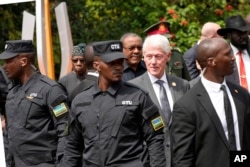Rwanda is marking the 30th anniversary of the genocide in which an estimated 800,000 people were killed by government-backed extremists, as the small East African country continues to grapple with the horrific aftermath of the massacre.
In the years since, Rwanda has shown strong economic growth, but scars remain, raising questions about whether President Paul Kagame’s long rule has led to true reconciliation, as his rebel movement halted the genocide and seized that power.
Kagame, praised by many for bringing relative stability but vilified by others for being intolerant of dissent, will preside over solemn commemorations in the capital Kigali on Sunday. Foreign visitors included delegations led by U.S. President Bill Clinton during the genocide and Israeli President Isaac Herzog.
Kagame lit a memorial flame and laid a wreath at the memorial site in Kigali where the remains of 250,000 genocide victims are buried.
The massacre was ignited when a plane carrying then-president Juvenal Habyarimana, an ethnic Hutu, was shot down over Kigali. Tutsis were blamed for shooting down the plane and killing the president. In 1994, Hutu extremists launched a massacre that lasted more than 100 days. Some moderate Hutus who tried to protect the Tutsis were also killed.
Rwandan authorities have long accused the international community of ignoring warnings about the killings, and some Western leaders have expressed regret.
After leaving office, Clinton viewed the Rwandan genocide as a failure of his administration.
French President Emmanuel Macron said in a pre-recorded video ahead of Sunday’s ceremony that France and its allies could have stopped the genocide but lacked the will to do so.
Three years ago, Macron admitted France – Rwanda’s closest European ally in 1994 – had a “huge responsibility” for failing to prevent Rwanda from descending into massacre.
Rwanda’s ethnic composition has remained essentially unchanged since 1994, with the Hutu majority. Among Rwanda’s 14 million people, Tutsis account for 14% and Tuva only 1%. Kagame’s Tutsi-dominated government has banned any form of ethnic organization as part of efforts to create a unified Rwandan identity.
National identity cards no longer identify citizens by race, and authorities have implemented harsh criminal laws to prosecute those suspected of denying the genocide or the “ideology” behind it. Some observers say the law is used to silence critics who question government policies.
Rights groups have accused Kagame’s soldiers of carrying out some killings during and after the genocide in apparent retaliation, but Rwandan authorities view the accusations as an attempt to rewrite history. Kagame has previously said his troops showed restraint in the face of the genocide.
Kagame is expected to speak and a night vigil will be held later on Sunday as part of a week of commemorations.
Naphtal Ahishakiye, head of the well-known survivor group Well Deep, told The Associated Press that preserving the memory of the genocide can help combat a mentality in which neighbors attack each other and even kill children. Thirty years later, mass graves are still found across Rwanda, a reminder of the scale of the killings.
“Now is the time to understand what happened, why it happened, and what the consequences of the genocide are for us as genocide survivors, for our country and for the international community,” Ashishakiye said.
He said his country had come a long way since the 1990s, when only survivors and government officials attended commemorations. “But today, even the perpetrator’s family members are here.”
Kagame, who grew up as a refugee in neighboring Uganda, has been Rwanda’s de facto ruler, first as vice president and then as acting president from 1994 to 2000. He was elected in 2003 and has been re-elected several times since. As a candidate in elections scheduled for July, he won the last election with nearly 99 percent of the vote.
Human rights activists and others say dictator Kagame has created a climate of fear that hinders open and free discussion of the country’s problems. Critics accuse the government of forcing opponents to flee, imprison or disappear, while some have been killed under mysterious circumstances. Kagame’s most serious political opponents are his former Tutsi comrades now in exile.
Although Rwanda is largely peaceful, its relations with its neighbors are problematic.
Tensions have increased in Congo recently, with leaders from both countries accusing each other of supporting armed groups. Relations with Burundi have also been strained by accusations that Kigali supports rebel groups attacking Burundi. Relations between Rwanda and Uganda have yet to be fully normalized due to Rwanda’s accusations that Uganda supports rebels against Kagame.
Follow us on Google news ,Twitter , and Join Whatsapp Group of thelocalreport.in
